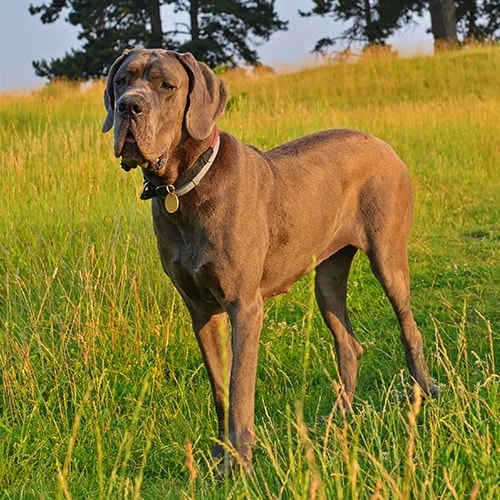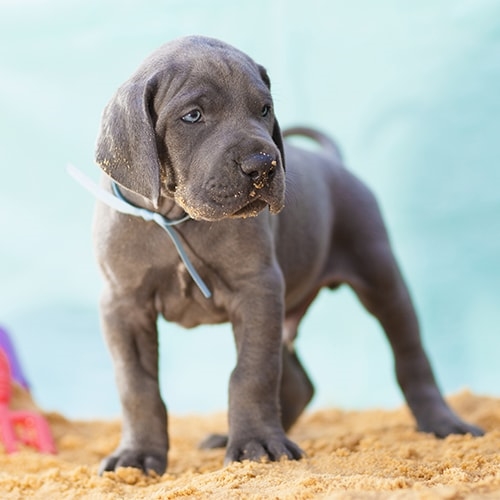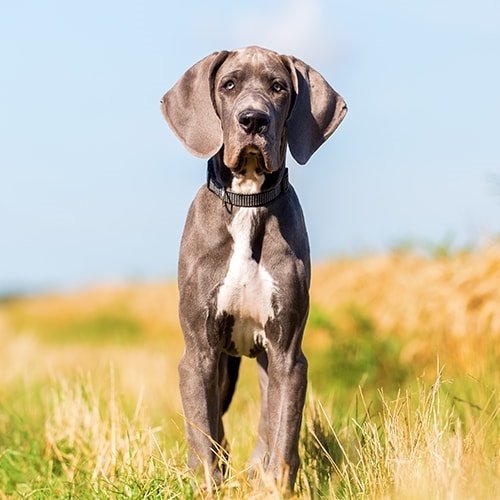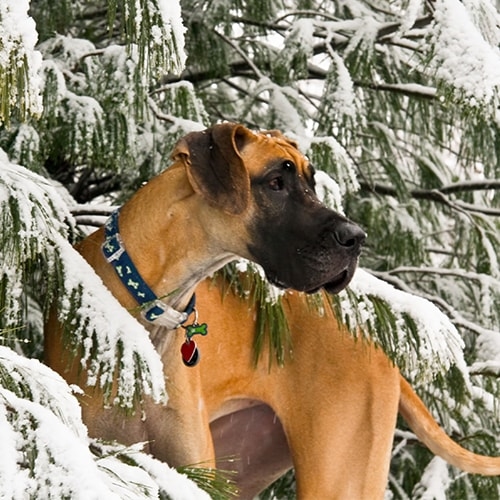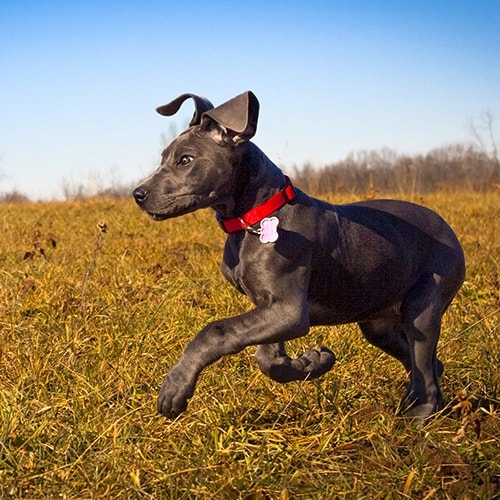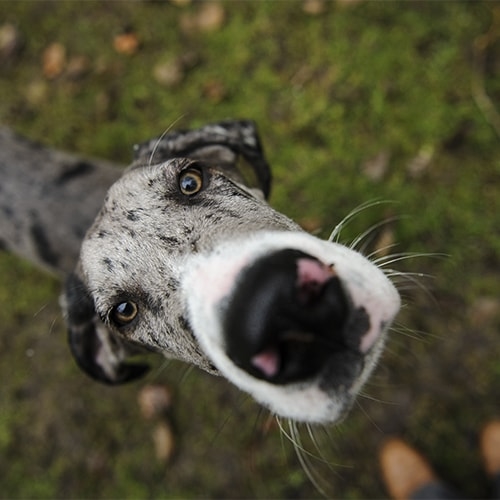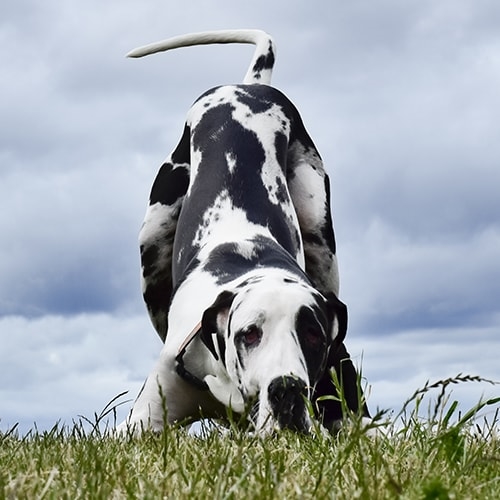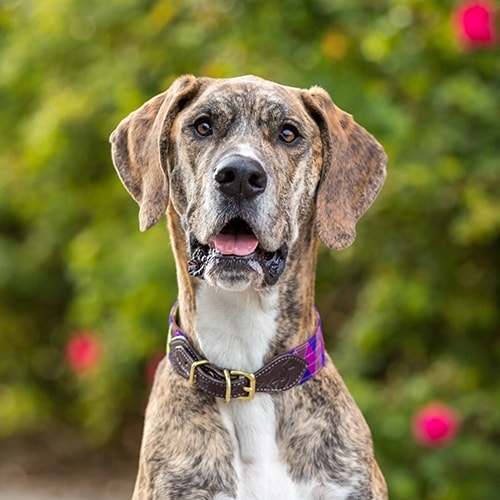| Size | Large |
|---|---|
| Average height | 71-76 cm |
| Average weight | 46-54 kg |
| Average lifespan | Under 10 years |
| Minimum exercise (per day) | 2 hours |
| Coat length | Short |
| Minimum cost (per month) | £105 |
Great Danes are a large, working breed loved for their giant size but gentle and sweet natures. They are an intelligent breed, making them easy to train in the right hands, but are still very playful and love spending time with their family.
They are a very impressive breed due to their size. Although they were originally bred for hunting and later as guard dogs, their loyalty and love for their owners has made them popular family pets. They need plenty of space, so a large house and garden is a must if you’re looking at getting a Great Dane!
Common health problems in Great Danes
Great Danes are considered real gentle giants who have unlimited love and affection for their families. Unfortunately, like so many other pure bred dogs, they are at risk of certain problems and conditions relating to their breed.
If you are thinking of buying a Great Dane puppy, make sure the parents of your puppy have had the relevant health screening to reduce the chances of your puppy being affected by certain conditions. We’d recommend looking for a Kennel Club Assured Breeder as they meet extra requirements which will benefit your puppy’s health.
Some of the conditions Great Danes may develop include:
- Gastric Dilatation Volvulus (GDV) – this is where the stomach twists. It is an emergency and requires urgent veterinary attention.
- Hip dysplasia – where the hip joint doesn’t fit together perfectly, which will eventually lead to arthritis. Before breeding, dogs should be screened by x-rays through the BVA/Kennel Club Hip Dysplasia Scheme.
- Elbow dysplasia – where the elbow joint doesn’t fit together perfectly, which will eventually lead to arthritis. There is BVA screening for this.
- Dilated Cardiomyopathy (DCM) – a type of heart disease which means their heart is bigger than it should be and doesn’t function properly.
- Eye problems – a range of eye conditions including in-turning or out-turning (entropion/ectropion) of the eyelids, glaucoma, cherry eye and medial canthus. pocketing. There is BVA/KC screening for some of these conditions.
- Wobbler Syndrome – where the bones in the neck are unstable and causing their back legs to be weak.
- Certain cancers.
- Inherited myopathy of Great Danes (IMGD) – a DNA test to screen breeding dogs for this muscle wasting disease.
If you want to minimise the risk of your dog getting problems due to exaggerated features, you can read our advice on choosing a pedigree dog.
Caring for your Great Dane
Great Danes are large but loyal dogs and can be great pets in the right household, but due to their size and strength they may not be ideal for families with smaller children. Great Danes need plenty of exercise and a lot of space so they tend to suit countryside living really well. In the very least, owners will need a large and secure garden for their Great Dane.
Great Danes love to have their family around for company and like most dogs will get upset if they are left alone. You might find that they chew your furniture and possessions when they’re bored or left alone so it’s best to have someone around to keep them company.
Great Danes and barking
As with any dog, Great Danes are likely to make noise and it’s down to the individual dog how much they bark or vocalise. Generally speaking, Great Danes are not known for being excessive barkers which is another reason they are a popular pet. Most owners find that the breed will only bark when they deem it absolutely necessary (but this may not be when you think it’s necessary!). If you’re having problems with excessive noise or barking, we recommend seeking the advice of an accredited behaviourist.
Training and socialisation
Great Danes are very intelligent and eager to learn which makes them easy to train for people already familiar with the breed. Some owners may find them a little strong willed when training them so it’s important to start positive, reward-based training from a young age and make sure their training is consistent throughout their life. If you don’t have much experience with Great Danes, or are a first time owner, you might want to ask for the help of an accredited trainer.
Great Danes are an incredibly loving breed and form strong attachments to their families, but are also known for being sensitive and may not adapt well to new situations. This is why it’s really important to socialise your Great Dane with different experiences, people and dogs from a young age. This will help your dog develop a well-rounded, easy going personality and let their loyal and loving nature shine.
Due to Great Danes forming such a strong bond with their owners, they might not even cope being alone for shorter periods. You should never leave your dog alone for more than four hours and you may find that your Great Dane needs training to be left even for shorter periods. A lonely and anxious Great Dane might be destructive around the home.
Exercise
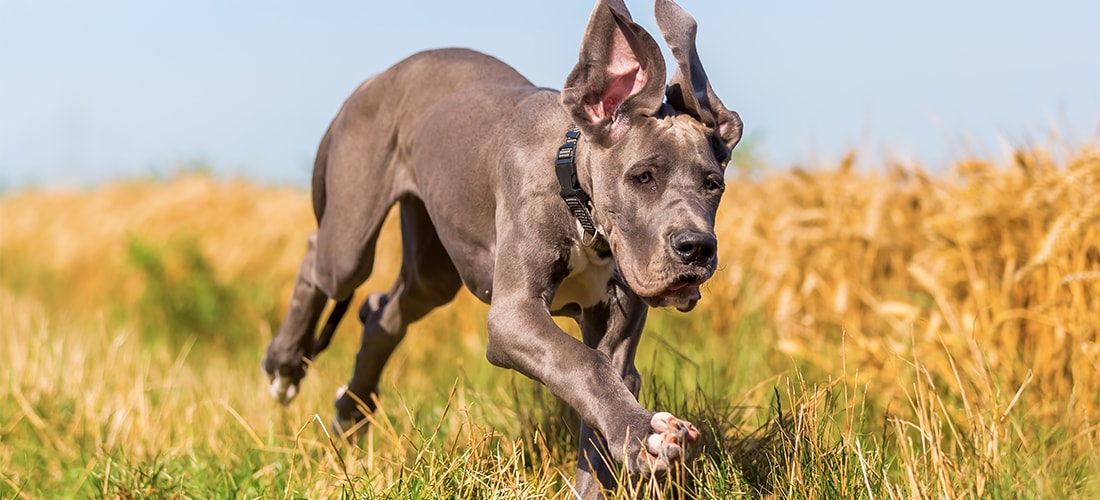
Great Danes are very active and playful dogs who need plenty of exercise to keep them fit and healthy. As the largest breed of dog, they need a lot of space both inside the house and outside so don’t really suit apartments or smaller homes. You may find that you need to move any valuable items from tail wagging height because an excited Great Dane could knock things over with their tail alone!
Great Danes need a minimum of two hours of exercise every day to burn off their excess energy and help keep them in shape. We’d recommend spreading this across the day rather than trying to do two hours in one go. It could be a combination of walks and off-lead exercise in a secure area. On top of this, your Great Dane will also need lots of free time in a large garden and training sessions to give them lots of variety. Be careful when exercising a Great Dane puppy as too much too soon could harm their bone and joint development. You can read more advice on exercising your Great Dane puppy on our website.
Grooming
Due to their short coats, Great Danes are relatively low maintenance when it comes to grooming. They do shed, but this is fairly minimal so a weekly brush should be more than enough to stay on top of any dead hairs. You may find your Great Dane sheds more in spring and autumn so might need extra grooming around this time.
Great Danes are, however, known for drooling! You may want to take something to mop them up while you’re out and about. They’re not the best dogs for house proud owners – one head shake and your home will be covered in drool!
Great Danes and children
Great Danes are known for being tolerant and loving given the right training and suit active households best due to their high energy. While they can make great family pets, we wouldn’t recommend a Great Dane if you have younger children due to their large size and strong build (and super strong tail!).
You should always supervise your Great Dane with children and vulnerable adults as they often don’t know their own strength and may accidentally knock them over. Great Danes have a reputation for their playful personalities so training is really important to avoid such a large dog jumping up at people.
Great Danes and other pets
Generally speaking, Great Danes are not known for being aggressive. Given the right socialisation from a young age, your Great Dane should get along perfectly fine with other dogs.
If your Great Dane has lived with a cat from a young age, they should get along fine. Great Danes do have a fairly strong prey drive, though, so all introductions need to be done very carefully. Never leave your Great Dane unsupervised with smaller pets.
Food
Your Great Dane’s diet will vary depending on their age and any health conditions they may have. You’ll need to feed them a complete, balanced dog food to keep them slim and healthy.
Your vet will be able to tell you how much your Great Dane should be eating. Keep in mind that due to their size, your Great Dane may eat more than you expect and food bills can quickly rise. You should feed them a good quality, commercially available, complete dog food. We usually recommend splitting their daily allowance into two meals. If you give your dog the occasional treat or use treats for training, remember to take this into account and reduce their daily allowance. Treats shouldn’t make up more than 10% of their daily calorie intake as this can unbalance their diet.
You should try to feed your dog at the same time every day to get them into a routine. Remember to leave at a gap after eating and before exercising to help prevent GDV (Gastric dilatation volvulus or ‘bloat’).
The cost of owning a Great Dane
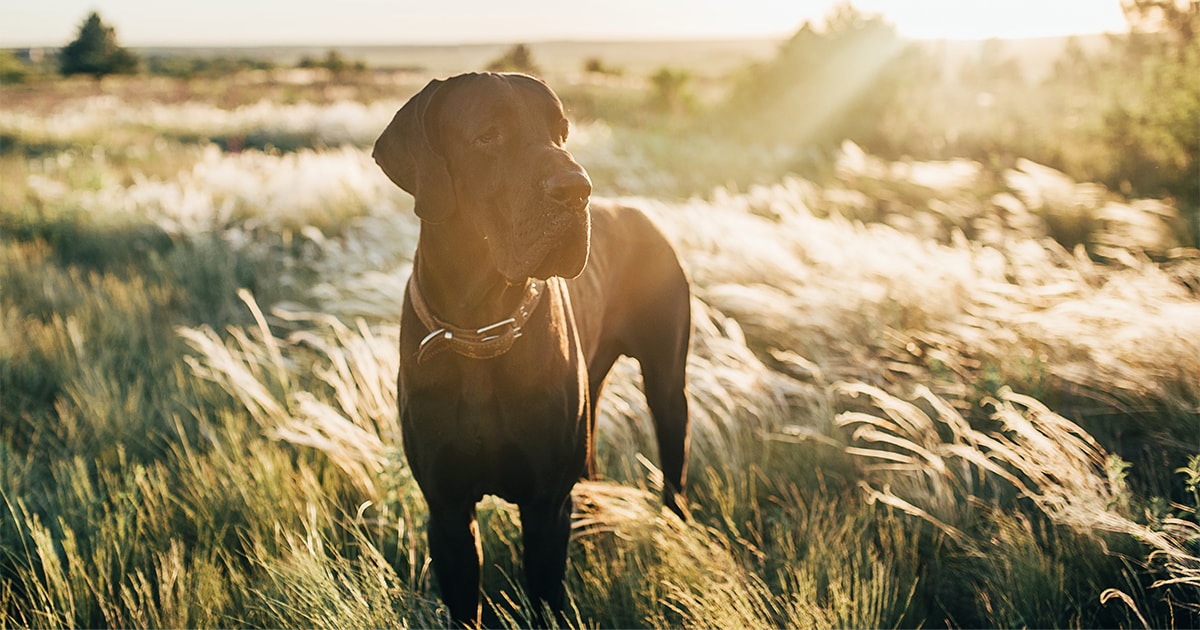
You can expect your Great Dane to cost you a minimum of £105 per month after purchase and set-up costs and over £17,000 across their lifetime.
Costs you’ll need to think about include:
Purchase costs
Adopting an adult Great Dane from a rescue centre may be a more cost-effective option, with the added advantage of giving a home to a pet without one – check if the rehoming centre you’re looking at asks for a donation for rehoming.
If instead you’re buying a Great Dane puppy from a breeder, you’ll need to factor in this cost. Beware unusually cheap puppies as they could come from a puppy farm. If you’d like to buy a pedigree puppy, we recommend looking for a Kennel Club Assured breeder. These breeders must do extra health tests and meet high standards.
Set-up costs
- Puppy vaccines – if you rescue a dog, reputable centres will often vaccinate them for you. Remember that ongoing booster vaccinations will be needed to continue their immunity.
- Neutering – you should usually arrange for your dog to be neutered at around 6-12 months old, although this is likely to be longer with a Great Dane but your vet will be able to advise you exactly when is best. Check prices at your local practice as these will depend on your vet and where you live. Some rescue centres will neuter any dogs they rehome, saving you this cost.
- Equipment – including a collar and tags, lead, harness, dog beds, dog bowls, pet-safe toothpaste and toothbrushes, grooming brushes and toys. Keep in mind that all these will need to be replaced with wear or damage or if your dog outgrows or damages them!
Ongoing costs
- Food.
- Preventive healthcare – budget for routine vet visits to help stop your dog getting ill and catch any problems early. They need annual check-ups, vaccinations and regular flea and worming treatments. Check if your vet offers a health care plan as this can help spread the cost throughout the year.
- Vet bills* or pet insurance – if you don’t have pet insurance and your dog needs veterinary treatment for an injury or illness, costs can rapidly mount up. Check what’s covered and what isn’t when comparing policies.
- Accessories – including lots of poo bags, replacing worn toys and grooming accessories, buying doggy toothpaste and any other extras they might need.
Other costs
- Training – basic training is very important and dogs can benefit from formal classes. Some dogs may have, or develop, behavioural problems which might need professional management.
- Boarding – you may also need to budget for boarding or dog sitting costs if you are planning to go away from home on holiday.
- Dog walkers/day-care – you might consider a professional dog walker to keep your dog happy and healthy if you’re unable to get out with your dog enough yourself, or to look after them during the day if you need to be out for more than four hours.
* It’s always better to plan ahead and budget or get pet insurance in case your pet gets injured or unwell. If you are having difficulty with veterinary costs, you can check if you are eligible for treatment at PDSA here.
If you’re considering pet insurance, our PDSA Pet Insurance could be a great option for you and it’s quick and easy to get a quote online.
Fun facts
- Great Danes are believed to be the largest breed of dog and are technically classed as a ‘giant’ breed. In fact, the tallest dog on record was a Great Dane named Zeus.
- One of the most famous Great Danes is Scooby Doo, because the breed was once thought to ward off ghosts and evil spirits.
- Great Danes grow really quickly, which means they can look like adult dogs but still in fact be puppy-age.
- Even though they’re so big, Great Danes still see themselves as lap dogs! They’ll often try to sit on their owner’s laps.
Getting a Great Dane
Do plenty of research before you get a Great Dane. These large and energetic dogs need plenty of space to be their silly selves and plenty of time and attention from their family. Given the right training, your Great Dane could develop into a sweet and loyal dog who will be a true friend for life, but you need to be absolutely sure you’re ready before taking on the responsibility of one of these gentle giants.
Rehoming centres
There are plenty of rescue centres across the country where you may find a Great Dane. Breed-specific rescues that specialise in Great Danes are also out there. You’ll need to ask any rescue centre about the dog’s history to make sure they will be comfortable in your home. Good rescue centres should let you know of any health and behaviour problems.
Breeders
If you buy from a breeder, make sure your puppy will be well socialised and have all necessary screening tests, health checks and vaccinations. It’s really important that Great Dane puppies from a breeder get the right early socialisation so always ask the breeder about how they go about this. We recommend looking for a Kennel Club Assured breeder as they meet higher standards. We’ve put together some advice to help you find a good breeder.

